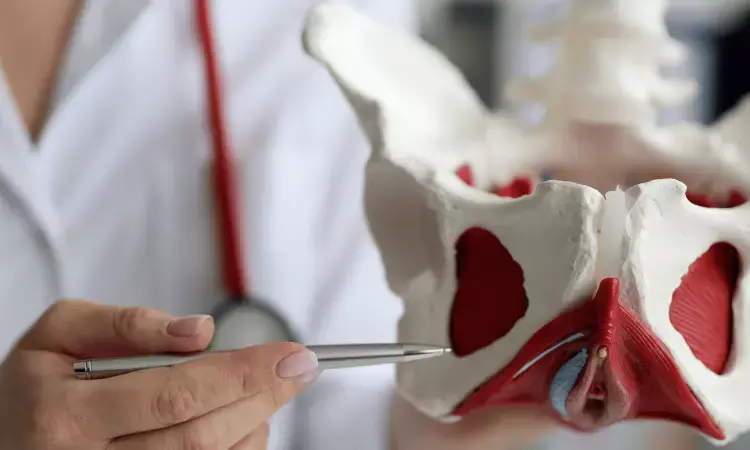- Home
- Medical news & Guidelines
- Anesthesiology
- Cardiology and CTVS
- Critical Care
- Dentistry
- Dermatology
- Diabetes and Endocrinology
- ENT
- Gastroenterology
- Medicine
- Nephrology
- Neurology
- Obstretics-Gynaecology
- Oncology
- Ophthalmology
- Orthopaedics
- Pediatrics-Neonatology
- Psychiatry
- Pulmonology
- Radiology
- Surgery
- Urology
- Laboratory Medicine
- Diet
- Nursing
- Paramedical
- Physiotherapy
- Health news
- Fact Check
- Bone Health Fact Check
- Brain Health Fact Check
- Cancer Related Fact Check
- Child Care Fact Check
- Dental and oral health fact check
- Diabetes and metabolic health fact check
- Diet and Nutrition Fact Check
- Eye and ENT Care Fact Check
- Fitness fact check
- Gut health fact check
- Heart health fact check
- Kidney health fact check
- Medical education fact check
- Men's health fact check
- Respiratory fact check
- Skin and hair care fact check
- Vaccine and Immunization fact check
- Women's health fact check
- AYUSH
- State News
- Andaman and Nicobar Islands
- Andhra Pradesh
- Arunachal Pradesh
- Assam
- Bihar
- Chandigarh
- Chattisgarh
- Dadra and Nagar Haveli
- Daman and Diu
- Delhi
- Goa
- Gujarat
- Haryana
- Himachal Pradesh
- Jammu & Kashmir
- Jharkhand
- Karnataka
- Kerala
- Ladakh
- Lakshadweep
- Madhya Pradesh
- Maharashtra
- Manipur
- Meghalaya
- Mizoram
- Nagaland
- Odisha
- Puducherry
- Punjab
- Rajasthan
- Sikkim
- Tamil Nadu
- Telangana
- Tripura
- Uttar Pradesh
- Uttrakhand
- West Bengal
- Medical Education
- Industry
Resuming physical activities following Prolapse Surgery Safe and effective: JAMA

An Original Investigation published in JAMA Surgery has demonstrated that it is reasonable to instruct patients to resume activities ad lib after prolapse surgery. Patients should be reassured that resuming physical activity quickly will not worsen anatomic or symptomatic outcomes.
There is a lack of evidence-based data regarding Restrictions on postoperative activity after pelvic organ prolapse (POP) surgery. Following surgery, many pelvic surgeons place lifting and activity restrictions on patients.
Considering this, researchers in the present study evaluated whether expedited activity results in noninferior anatomic and symptomatic outcomes compared with standard activity restrictions after POP surgery.
The key points in this research study are:
- There were 107 women of mean age 62.8 years in the study with stage ≥ 2 pelvic organ prolapse undergoing apical reconstructive surgery.
- The study was conducted in a single academic tertiary referral centre in Durham, NC.
- One hundred seven participants were randomized and analyzed as 54 in the standard postoperative activity instructions and 53 in the expedited postoperative activity instructions. Standard postoperative activity instructions were no lifting ≥ 10 lbs for six weeks, return to work at two weeks for sedentary work, and six weeks for manual work.
- Expedited postoperative activity instructions included no activity or weight lifting restrictions, resume activities and work as soon as able.
- The primary outcomes included anatomic and symptom outcomes.
- SLmax was the most distal point of pelvic organ support loss; noninferiority margin (NIM) 1.0 cm.
- POPDI or Pelvic Organ Prolapse Distress Inventory score range 0.300; a high score means more stress; NIM 34.3 points.
- At three months, the mean SLmax in the expedited and standard groups was −1.7 cm and −1.5 cm.
- The mean maximum support loss was 0.18 cm higher within the vaginal canal in the expedited group after adjusting for baseline SLmax.
- The coprimary outcome of the POPDI score in the expedited and standard group was mean (SD) 23.7 vs 25.7 points.
- After adjustments, the mean POPDI scores were 5.79 points lower in the expedited group.
The study's strength was related to the use of a randomized controlled noninferiority design, relevant primary anatomic and symptomatic measures, accelerometer data and occupation-related data.
Concluding further, they said, "Based on the findings of our study, patients receiving liberal activity instructions experienced noninferior anatomic and symptomatic outcomes at three months following vaginal or laparoscopic apical prolapse surgery without major complications."
Further reading:
O'Shea M, Siddiqui NY, Truong T, Erkanli A, Barber MD. Standard Restrictions vs Expedited Activity After Pelvic Organ Prolapse Surgery: A Randomized Clinical Trial. JAMA Surg. Published online May 31, 2023. doi:10.1001/jamasurg.2023.1649
BDS, MDS in Periodontics and Implantology
Dr. Aditi Yadav is a BDS, MDS in Periodontics and Implantology. She has a clinical experience of 5 years as a laser dental surgeon. She also has a Diploma in clinical research and pharmacovigilance and is a Certified data scientist. She is currently working as a content developer in e-health services. Dr. Yadav has a keen interest in Medical Journalism and is actively involved in Medical Research writing.
Dr Kamal Kant Kohli-MBBS, DTCD- a chest specialist with more than 30 years of practice and a flair for writing clinical articles, Dr Kamal Kant Kohli joined Medical Dialogues as a Chief Editor of Medical News. Besides writing articles, as an editor, he proofreads and verifies all the medical content published on Medical Dialogues including those coming from journals, studies,medical conferences,guidelines etc. Email: drkohli@medicaldialogues.in. Contact no. 011-43720751


